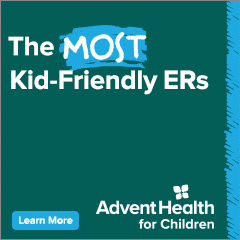Kids Beating Cancer
Orlando-born nonprofit has a wide reach when it comes to helping kids and families battle deadly diseases.
“Mommy, why do kids get leukemia?” Margaret Guedes recalls that her then 9-year-old son John Voight posed that question after battling the disease for four years. As it turned out, John didn’t have long to live, but his simple query created the legacy of the Orlando-based Kids Beating Cancer (KBC), a nonprofit founded by Guedes in 1992 after her harrowing journey in search of treatment for her son.
Instead of succumbing to the grief of losing John, Guedes vowed to help make access to treatment easier for other Central Florida families dealing with pediatric cancer, leukemia and other deadly diseases. She established the John Voight Memorial Foundation in 1992, just a few months after John’s death, changing the name to Kids Beating Cancer in 1996.
The organization primarily aims to provide top-notch transplant treatment close to home for children up to age 19 and to support the families throughout the journey. They’ve enjoyed great success in the time since, but only with the help and involvement of the Greater Orlando community—and they’ll need more if they’re to continue their mission in the years to come.
Painful Past, Hopeful Future
KBC’s roots can be traced to 1988, when 4-year-old John received the life-threatening diagnosis of Myelodysplastic Syndrome (MDS), which then evolved into acute myeloblastic leukemia (AML). He had only a 15-percent chance of survival, which was boosted to 30 percent with a bone-marrow transplant. The problem? To identify a donor and receive treatment, John had to go to a pediatric transplant center in Seattle. And that’s when the real struggle began.
Guedes left her Central Florida home, said goodbye to family and friends, and traveled with John, his younger brother and his newborn sister to stay in Seattle for the duration of John’s treatment—100-plus days. The four years that followed proved to be a blur of hospital rooms, painful treatments and two bone-marrow transplants. Sadly, the treatments couldn’t save John, who died at the age of nine.
“The intensity of the process, and why I was extremely passionate, came from the frustration from the four years we had to go to Seattle,” explains Guedes. “That destroyed our family.”
In picking up the pieces of her life, Guedes has since changed the face of Central Florida and beyond. In its 24 years, KBC has served over 8,500 children, raised $14 million and tested more than 37,000 potential bone-marrow and stem-cell donors.
In 2012, the nonprofit opened the Kids Beating Cancer Pediatric Transplant Center at Florida Hospital for Children—the first and only pediatric marrow transplant center in Central Florida. Thanks to cutting-edge research, state-of-the-art technology, superb staff and the award-winning skills of Medical Director Dr. David Shook, this center literally provides a lifeline for children whose only hope for a healthy future is through a bone-marrow or stem-cell transplant.
Providing Needed Support
Regardless of hospital affiliation or insurance, KBC provides financial assistance, resources and support for patients and the families of children with cancer, leukemia and other life-threatening diseases before, during and after treatment. KBC also pays for testing and other expenses not covered by Medicaid or insurance, so families never receive the often staggering hospital bills. Guedes estimates that searching for a compatible donor can range from $3,500-$5,000 (for related donors) to $15,000-$50,000 (for unrelated donors). The actual transplant procedure can cost up to $450,000.
One of KBC’s cornerstones is its level of provided support, be it medical, financial or emotional. From paying for the families’ meals to throwing seasonal parties to providing free tickets for fun events, activities and theme parks, the nonprofit strives to make life more enjoyable for everyone affected during the long months of treatment.
For instance, to take the sting out of a hospital stay and soften the look of their high-tech room, children get to customize their temporary “home away from home” with themed sheets, bedding, pajamas, toys and games. Kids also receive a teddy bear for cuddly comfort as well as gifts to mark milestones, such as celebrating the 100th day post-transplant.
“KBC is so involved and hands-on,” says Tashas Wilson, mother of 4-year-old Eden Daniels, diagnosed in 2014 with Stage 4 neuroblastoma and in remission since January 2015. “They become a part of your family and extra support system. They extend genuine love, and this is something you can’t put a price tag on.
“KBC is filled with people who understand and have walked in your shoes,” she adds. “They surround you with other families who have children that look just like yours with no hair, weak eyes, but yet still a big smile.”
Helping Families Heal
Since the opening of the high-tech KBC Pediatric Transplant Center, 26 children have received bone-marrow and stem-cell transplants. One of them is Mandy Jackson, a 6-year-old from Port Orange who loves to sing, dance ballet and play with her American Girl dolls. Diagnosed with Stage IV neuroblastoma in 2011 just shy of her second birthday, Mandy faced six rounds of high-dose chemotherapy, a 10-hour surgery, two stem-cell transplants, radiation and six months of antibody therapy, only to have her cancer return in March 2015.
“Without the transplant center, Mandy would have had to transfer to All Children’s Hospital in St. [Petersburg, Florida],” says her mother, Jessica. “It would have meant that only she and I would have been over there—three hours from our home, support system, family and friends. Comfort and support is a huge part of healing, and at the KBC transplant center you have that and more.”
Echoing this sentiment is Theo Menswar, who turns 19 this month. Diagnosed at 14 with MDS, Theo spent 263 continuous days in treatment at the KBC Pediatric Transplant Center before finally being able to return to his home in Cocoa. In August, Theo celebrated his four-year post-transplant anniversary. In between his three-times-a-week dialysis while awaiting a kidney transplant, Menswar takes classes at Eastern Florida State College and hopes to pursue a career as a graphic designer.
Despite the fact that his days were filled with tests, needles, medication and doctor visits, Menswar simply gushes when talking about all the center has done for him.
“I love, love, love the people there,” he says. “The nurses are like family to me. I’m the lucky one. And Margaret [Guedes]? I love her! She’s basically a fairy godmother to everyone in the unit.”
Currently, the transplant center can accommodate up to eight patients, but Guedes hopes to double the capacity. This, of course, requires more funding. KBC relies heavily on corporate giving, individual donations and fundraisers, with 94 percent of every dollar raised going to support its programs and services.
Want to help? You can make a charitable donation, donate items on KBC’s wish list or volunteer for family-friendly projects such as helping with the family parties. For a truly hands-on project, sponsor a child’s hospital room, which allows your family to shop for themed items and help decorate the room together—talk about a teachable moment.
Lisa Beach is a freelance writer, humor blogger, mother of two teenagers, and recovering homeschool mom who lived to write about it. More of her writing can be found at LisaBeachWrites.com and TweeniorMoments.com.








